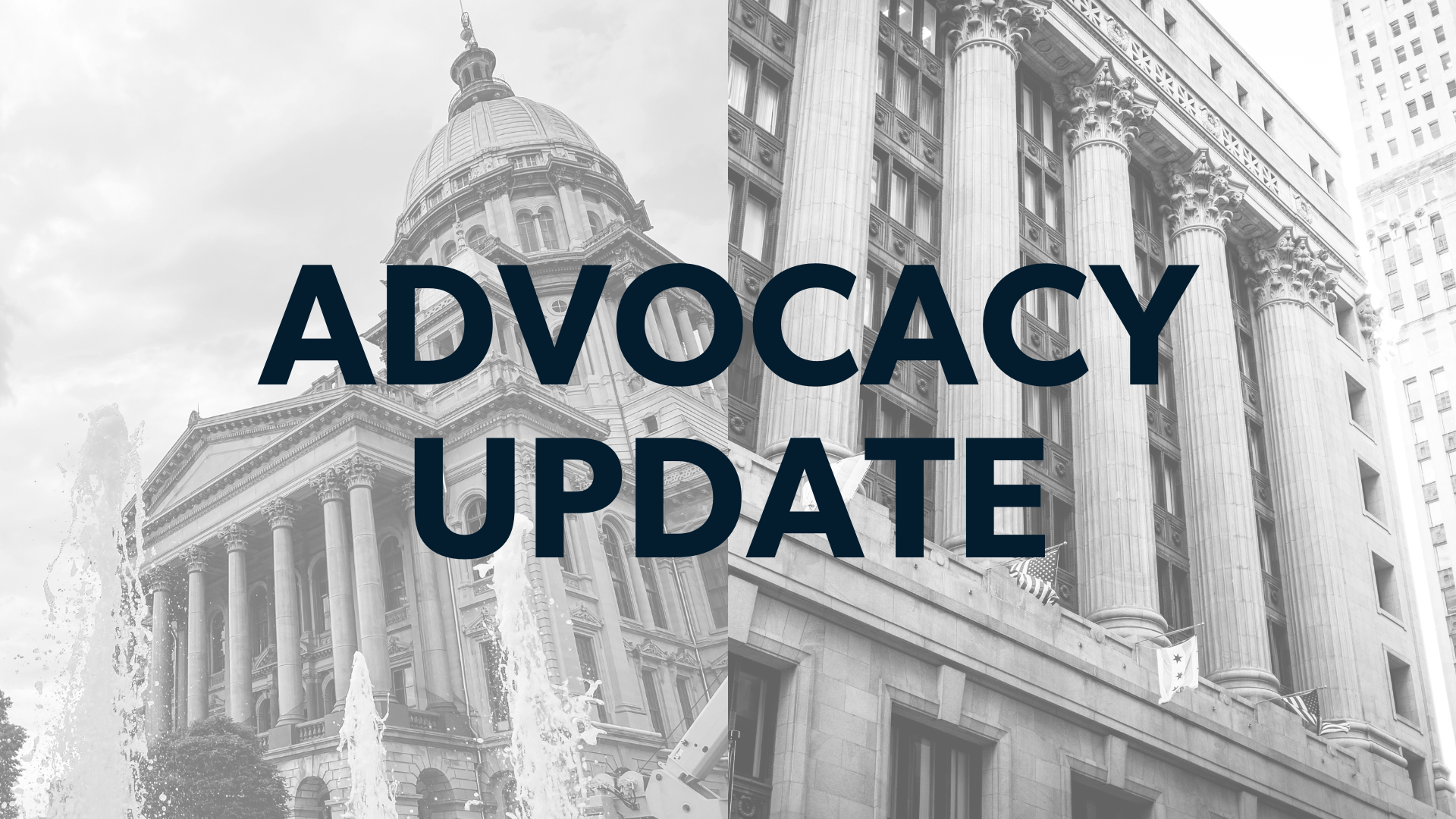On Tuesday, October 1, we held our monthly “Coffee with Your GADs” chat, where members join our Government Affairs Directors for an informal discussion about policy and politics impacting the real estate industry. This is an opportunity for members to learn about CAR’s current real estate advocacy initiatives and share any news or trends of interest.
This month, we welcomed special guests Paul Colgan, Home Builders Association of Greater Chicago, and Alderman Gill Villegas, 36th Ward, to share insights on some local public policy issues. Check it out:
Local Issues
Just Housing
The ordinance that prevents landlords and property managers from refusing to show a unit to tenants based on tenants’ criminal background just passed and is now in rulemaking.
CAR’s biggest concern is the lookback period is only five years, and CAR was looking for a minimum of seven. Also, as it stands, should a tenant with an alleged criminal background dispute the findings, there is a 10-day dispute period and during this time, the landlord/housing provider has to hold the property instead of giving it to someone who immediately ready and eligible.
Special Guests
Paul Colgan of the Home Builders Association of Greater Chicago paid us another visit. Here’s what he had the say:
- Affordable Requirements Ordinance Update: There are two Housing Committee meetings scheduled in the next month, but the schedules were not released as of October 1st, so we don’t know if some of the proposed ordinances are in consideration. One of the ordinances comes from the Progressive Caucus, and requires as much 30 percent ARO per building. This means a three-flat residential would have to have one affordable unit. The Home Builders Association believes limitations such as these are not the proper solutions to affordable housing. Rather, the Home Builders want to find ways to incentivize builders to provide units that as they are needed.
The Home Builders is pushing for legislation that would take the benefits of the City of Chicago’s Enterprise Zone Program and apply it to housing. This would mean that if housing was built in an Enterprise Zone, there would be a 60 percent tax assessment break as well as sales tax and transfer tax exemptions. The rationale is that construction costs are the same throughout Chicago and there’s not much of a differential in land cost for incentivize builders to create affordable units. The Home Builders hopes to have legislation drafted by the end of this fall.
In a report the Home Builders Association did with CDW, they found the City of Chicago has lost over $1 billion due to projects that didn’t go forth due to the ARO’s limitations. This includes labor, professional fees, supplies, etc.
Alderman Gilbert Villegas of the 36th Ward is also the Floor Leader in City Council, which means he makes votes on Mayor Lightfoot’s behalf and in tune with her agenda.
Villegas is a former REALTOR®. Prior to joining City Council, he ran a trade association in the construction industry, and lobbied for public policy initiatives in Springfield. In 2011, Villegas joined Governor Quinn’s administration to run a construction initiative called the Capital Development Board.
- Lots of Regional Construction Activity: The state of Illinois’ Capital Bill will bring $25 million in construction throughout the state as well as another initiative that will bring $8.5 billion for an airport – this would include a new terminal and three hotels. Villegas noted that any revenue generated for the airport has to be put back into the airport. Villegas also shared his excitement for private developments including Lincoln Yards and The 78.
- Looking at the City’s Budget: Now, working with Mayor Lightfoot, Villegas is candid the $838 million deficit that exist in the City of Chicago and the urgency to find a solution to cover pension obligations. Mayor Lightfoot’s budget proposal will be made late October 23, and Villegas calls it “fluid.” All options for generating additional revenue are on the table, including working with Springfield to have modifications made to casino legislation. The casino legislation was passed in the last session and allows for gaming expansion throughout the state. Chicago has been identified as a site for a casino, but the exact location hasn’t been selected yet because the tax structure doesn’t work. There’s a 72 percent tax, and so it’s not attractive to casino operators. This is compared to areas like Rosemont, whose casino tax is in the 30s. If legislation is adjusted, Villegas advocates for multiple casinos, each placed inside existing hotels.
During veto session, the City of Chicago will make its presence known in Springfield, Villegas said. “When Chicago catches a cold, Illinois catches the flu,” he said. “We are the economic engine, not just for the state, but for the region.”
Villegas encourages REALTORS® and their clients to make their voices heard now and even at the budget address. The final budget has to be passed by December 31, 2019.
STATE ISSUES
Upcoming Veto Session
The Illinois General Assembly will be in Veto Session from October 28 to November 15. During this time, CAR expects:
- Assessor Fritz Kaegi to keep pushing his tax reform package.
- Rent control advocates to take another try at getting it pushed through.
More information on state legislative issues can be found in the Illinois REALTORS® Legislative Scorecard.
NATIONAL ISSUES
Flood Insurance:
There was a six-month extension passed. CAR continues to be an advocate for a long-term extension.
Qualified Opportunity Zones (QOZs):
There are no legislative updates for the federal Qualified Opportunity Zones (QOZs) program, but CAR continues to promote the program and encourage REALTORS® and their clients to learn more about the program and begin investing where it makes sense. Last week, following the GAD meeting, CAR invited Chicago’s aldermen to a private working session with Smart Growth America, an organization focused on QOZs.
CAR is asking for an extension of the program to allow more time for people to be educated about its policies and have time invest.
Get Involved
GAD Kristopher Anderson encouraged members to learn about elevated volunteer opportunities that allow REALTORS® to get more involved in advocacy initiatives:
Federal Political Coordinator
NAR’s Federal Political Coordinators (FPC) program assigns one REALTOR® to each member of Congress (435 members of the House and 100 Senators). It allows REALTORS® to have direct access and give member perspective on how legislation impacts the real estate industry.
State Legislative Contact
The State Legislative Contact (SLC) program is the same as the FPC program, but it’s ran by Illinois REALTORS®. Each of our 118 State Representative and 59 State Senators is appointed one SLC.
Have a GAD Visit Your Office
If you missed the meeting or would like more info – our GADs can come to you! If you’d like to have a GAD visit your office, fill out this request form, and a member of the team will get back to you soon.
Up Next
- Register for next Coffee with Your GADs meeting on November 5. As always, it’s free but seats fill up quickly!
- We’re taking deep dive into the commercial real estate public policy issues on November 13. Join us at the CommericialForum Advocacy Breakfast.







